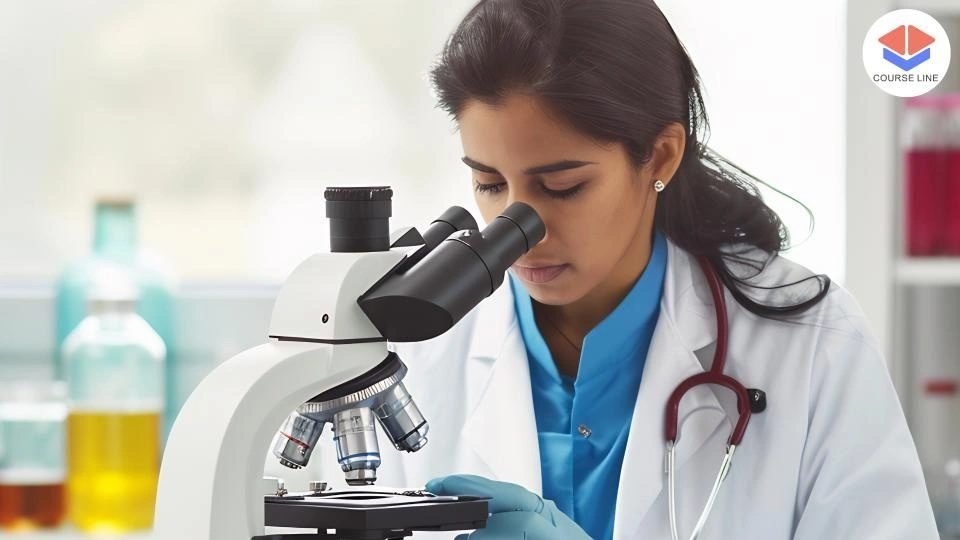Course Features
Price
Study Method
Online | Self-paced
Course Format
Reading Material - PDF, article
Duration
5 hours, 15 minutes
Qualification
No formal qualification
Certificate
At completion
Additional info
Coming soon
- Share
Overview
The Pathology Level 5 Advanced Diploma is designed to provide comprehensive insights into the study of disease processes and the science behind diagnosis. Starting with a foundational understanding of what pathology is and the crucial role a pathologist plays in modern healthcare, students are introduced to the terminology and concepts essential to this scientific field.
The programme then delves into cellular pathology, where learners examine how cells respond to injury, inflammation, and how tissue repair occurs. Systemic pathology follows, exploring specific disease mechanisms across key systems including the cardiovascular, respiratory, gastrointestinal, and hepatobiliary systems. This holistic view allows learners to understand how diseases affect different organs and how such changes are detected and interpreted.
Further advancing the course, clinical pathology is covered with an emphasis on hematopathology, renal pathology, and endocrine system disorders. Learners are introduced to laboratory testing methods such as urinalysis and blood analysis, which are integral to patient diagnosis and management. Molecular pathology introduces genetic disorders and cutting-edge molecular techniques used in modern diagnostics, while microbial pathology teaches the biological behaviour of bacteria, viruses, fungi, and parasites.
The study of neoplasia explores tumor biology and the mechanisms of carcinogenesis, critical for understanding cancer pathology. The course concludes with diagnostic laboratory techniques including histopathology and cytopathology, as well as laboratory management best practices focusing on quality assurance and control.
This course provides a robust academic and practical grounding in pathology, preparing learners for advanced academic study or to enter healthcare and biomedical science careers. It is also ideal for those seeking to support diagnostic and research functions in clinical laboratories.
Who is this course for?
The Pathology Level 5 Advanced Diploma is designed to provide comprehensive insights into the study of disease processes and the science behind diagnosis. Starting with a foundational understanding of what pathology is and the crucial role a pathologist plays in modern healthcare, students are introduced to the terminology and concepts essential to this scientific field.
The programme then delves into cellular pathology, where learners examine how cells respond to injury, inflammation, and how tissue repair occurs. Systemic pathology follows, exploring specific disease mechanisms across key systems including the cardiovascular, respiratory, gastrointestinal, and hepatobiliary systems. This holistic view allows learners to understand how diseases affect different organs and how such changes are detected and interpreted.
Further advancing the course, clinical pathology is covered with an emphasis on hematopathology, renal pathology, and endocrine system disorders. Learners are introduced to laboratory testing methods such as urinalysis and blood analysis, which are integral to patient diagnosis and management. Molecular pathology introduces genetic disorders and cutting-edge molecular techniques used in modern diagnostics, while microbial pathology teaches the biological behaviour of bacteria, viruses, fungi, and parasites.
The study of neoplasia explores tumor biology and the mechanisms of carcinogenesis, critical for understanding cancer pathology. The course concludes with diagnostic laboratory techniques including histopathology and cytopathology, as well as laboratory management best practices focusing on quality assurance and control.
This course provides a robust academic and practical grounding in pathology, preparing learners for advanced academic study or to enter healthcare and biomedical science careers. It is also ideal for those seeking to support diagnostic and research functions in clinical laboratories.
Requirements
The Pathology Level 5 Advanced Diploma is designed to provide comprehensive insights into the study of disease processes and the science behind diagnosis. Starting with a foundational understanding of what pathology is and the crucial role a pathologist plays in modern healthcare, students are introduced to the terminology and concepts essential to this scientific field.
The programme then delves into cellular pathology, where learners examine how cells respond to injury, inflammation, and how tissue repair occurs. Systemic pathology follows, exploring specific disease mechanisms across key systems including the cardiovascular, respiratory, gastrointestinal, and hepatobiliary systems. This holistic view allows learners to understand how diseases affect different organs and how such changes are detected and interpreted.
Further advancing the course, clinical pathology is covered with an emphasis on hematopathology, renal pathology, and endocrine system disorders. Learners are introduced to laboratory testing methods such as urinalysis and blood analysis, which are integral to patient diagnosis and management. Molecular pathology introduces genetic disorders and cutting-edge molecular techniques used in modern diagnostics, while microbial pathology teaches the biological behaviour of bacteria, viruses, fungi, and parasites.
The study of neoplasia explores tumor biology and the mechanisms of carcinogenesis, critical for understanding cancer pathology. The course concludes with diagnostic laboratory techniques including histopathology and cytopathology, as well as laboratory management best practices focusing on quality assurance and control.
This course provides a robust academic and practical grounding in pathology, preparing learners for advanced academic study or to enter healthcare and biomedical science careers. It is also ideal for those seeking to support diagnostic and research functions in clinical laboratories.
Career path
The Pathology Level 5 Advanced Diploma is designed to provide comprehensive insights into the study of disease processes and the science behind diagnosis. Starting with a foundational understanding of what pathology is and the crucial role a pathologist plays in modern healthcare, students are introduced to the terminology and concepts essential to this scientific field.
The programme then delves into cellular pathology, where learners examine how cells respond to injury, inflammation, and how tissue repair occurs. Systemic pathology follows, exploring specific disease mechanisms across key systems including the cardiovascular, respiratory, gastrointestinal, and hepatobiliary systems. This holistic view allows learners to understand how diseases affect different organs and how such changes are detected and interpreted.
Further advancing the course, clinical pathology is covered with an emphasis on hematopathology, renal pathology, and endocrine system disorders. Learners are introduced to laboratory testing methods such as urinalysis and blood analysis, which are integral to patient diagnosis and management. Molecular pathology introduces genetic disorders and cutting-edge molecular techniques used in modern diagnostics, while microbial pathology teaches the biological behaviour of bacteria, viruses, fungi, and parasites.
The study of neoplasia explores tumor biology and the mechanisms of carcinogenesis, critical for understanding cancer pathology. The course concludes with diagnostic laboratory techniques including histopathology and cytopathology, as well as laboratory management best practices focusing on quality assurance and control.
This course provides a robust academic and practical grounding in pathology, preparing learners for advanced academic study or to enter healthcare and biomedical science careers. It is also ideal for those seeking to support diagnostic and research functions in clinical laboratories.
-
- What is Pathology? 00:10:00
- The Role of a Pathologist 00:10:00
- Basic Terminology and Concepts 00:10:00
-
- Cell Injury and Death 00:10:00
- Inflammation and Repair 00:10:00
- Pathological Changes in Cells and Tissues 00:10:00
- Cardiovascular Pathology 00:10:00
- Respiratory Pathology 00:10:00
- Gastrointestinal Pathology 00:10:00
- Hepatobiliary Pathology 00:10:00
- Introduction to Molecular Pathology 00:10:00
- Genetic Disorders 00:10:00
- Molecular Techniques in Pathology 00:10:00
- Introduction to Neoplasia 00:10:00
- Carcinogenesis 00:10:00
- Tumor Pathology 00:10:00
- Exam of Pathology Level 5 Advanced Diploma 00:50:00

No Reviews found for this course.
Is this certificate recognized?
Yes, our premium certificate and transcript are widely recognized and accepted by embassies worldwide, particularly by the UK embassy. This adds credibility to your qualification and enhances its value for professional and academic purposes.
I am a beginner. Is this course suitable for me?
Yes, this course is designed for learners of all levels, including beginners. The content is structured to provide step-by-step guidance, ensuring that even those with no prior experience can follow along and gain valuable knowledge.
I am a professional. Is this course suitable for me?
Yes, professionals will also benefit from this course. It covers advanced concepts, practical applications, and industry insights that can help enhance existing skills and knowledge. Whether you are looking to refine your expertise or expand your qualifications, this course provides valuable learning.
Does this course have an expiry date?
No, you have lifetime access to the course. Once enrolled, you can revisit the materials at any time as long as the course remains available. Additionally, we regularly update our content to ensure it stays relevant and up to date.
How do I claim my free certificate?
I trust you’re in good health. Your free certificate can be located in the Achievement section. The option to purchase a CPD certificate is available but entirely optional, and you may choose to skip it. Please be aware that it’s crucial to click the “Complete” button to ensure the certificate is generated, as this process is entirely automated.
Does this course have assessments and assignments?
Yes, the course includes both assessments and assignments. Your final marks will be determined by a combination of 20% from assignments and 80% from assessments. These evaluations are designed to test your understanding and ensure you have grasped the key concepts effectively.
Is this course accredited?
We are a recognized course provider with CPD, UKRLP, and AOHT membership. The logos of these accreditation bodies will be featured on your premium certificate and transcript, ensuring credibility and professional recognition.
Will I receive a certificate upon completion?
Yes, you will receive a free digital certificate automatically once you complete the course. If you would like a premium CPD-accredited certificate, either in digital or physical format, you can upgrade for a small fee.
Course Features
Price
Study Method
Online | Self-paced
Course Format
Reading Material - PDF, article
Duration
5 hours, 15 minutes
Qualification
No formal qualification
Certificate
At completion
Additional info
Coming soon
- Share
Arabic language to understand The Holy Quran
Course Line238£490.00Original price was: £490.00.£14.99Current price is: £14.99.Facilities Management Level 5 Advanced Diploma
Course Line238£490.00Original price was: £490.00.£14.99Current price is: £14.99.Airport Management
Course Line246£490.00Original price was: £490.00.£14.99Current price is: £14.99.





